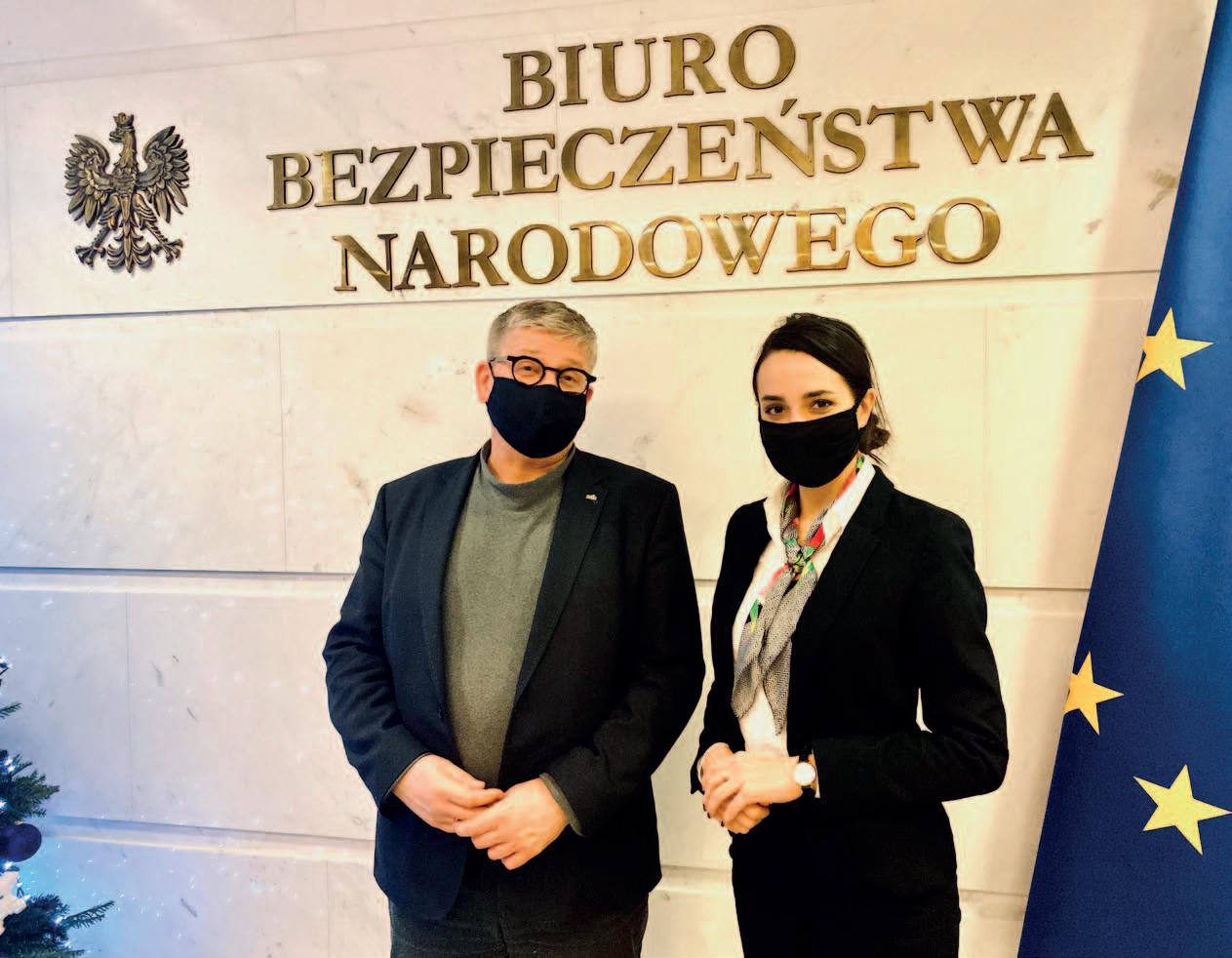
14 minute read
interview
PoLAnD's FoREIGn PoLICy In ThE BIDEn ERA
Izabela Wojtyczka's interview with Paweł Soloch
Advertisement
The opening of a new chapter and line of cooperation in Poland’s relations with the United States right after the beginning of Joe Biden’s presidency is what now regulates the foreign agenda of Poland and Europe. 2021 is not only the year of the evident challenges of the COVID-19 pandemic but also of two anniversaries – of the Weimar Triangle and the Visegrad Group. All this will shape the plans of individual countries towards the new Biden administration. In our interview, Paweł Soloch, Head of the National Security Bureau, speaks about relations with the US and security challenges.
Head of tHe NatioNal Security Bureau Paweł SolocH aNd editor-iN-cHief of tHe WarsaW InstItute revIeW Izabela Wojtyczka. WarsaW, February, 2021
what are the main axes of cooperation between poland and the united states in the new reality – the era of Joe biden’s presidency?
Close cooperation between Poland and the US is in the interest of both Warsaw and Washington. This will not change in our relations regardless of who resides in the White House or the Presidential Palace in Warsaw. One of the main goals will certainly be implementing the Polish–American agreement on enhancing the defense cooperation. This document, ratified last year by President Andrzej Duda, is supported by the key authorities both in the US and Poland. This is what gives us confidence and stability – also in relations with the administration of President Joe Biden. Increasing US military involvement on NATO’s eastern flank is of crucial importance not only for Poland but also for other countries in the region. Another valuable line of transatlantic cooperation is the Three Seas Initiative. It remains important to the new administration, which, like the previous one, will invest in this project. Washington treats the Three Seas Initiative in the broad context of its partnership not only with the countries interested in the Initiative but with Europe as a whole. The most important fields of cooperation are energy, transport, digital infrastructure, or current political challenges – not only on
the Old Continent. For a long time now, the Three Seas Initiative has not been seen as an insignificant project. Now we can consider it one of the pillars of the new opening of the US to Europe manifested not only by granting $300 million to the Three Seas Initiative Fund by the Congress – which has been approved already by the new administration – or by the calls of Congress members for stronger support of the Three Seas Initiative by their president. What adds to that is the constantly growing interest of the strongest economies in this international project. Rebuilding relations between the United States and Europe is no longer just about US–EU ties. It is very important to us that the Three Seas Initiative constitutes an addition and a new dimension to them.
Another important issue is Chinese activity in Europe. Relations with China are also one of the main issues in transatlantic ties of the European Union. Before President Joe Biden was sworn in, Brussels – acting mainly under the influence of Germany and France – had signed a strategic agreement with China on mutual investments. In this context, I would like to remind you of the good relations between the presidents of Poland and China, manifested this year by the two talks between President Andrzej Duda and President Xi Jinping within the 17+1 format and as part of bilateral contact of the two countries.
There’s also, of course, the question of relations of the US with Europe and Russia. Americans pay great attention to German–Russian ties conveyed by the symbolic and, at the same time, tangible investment – Nord Stream 2. The position of the United States remains unchanged in this respect. This initiative is of primarily political rather than economic nature and
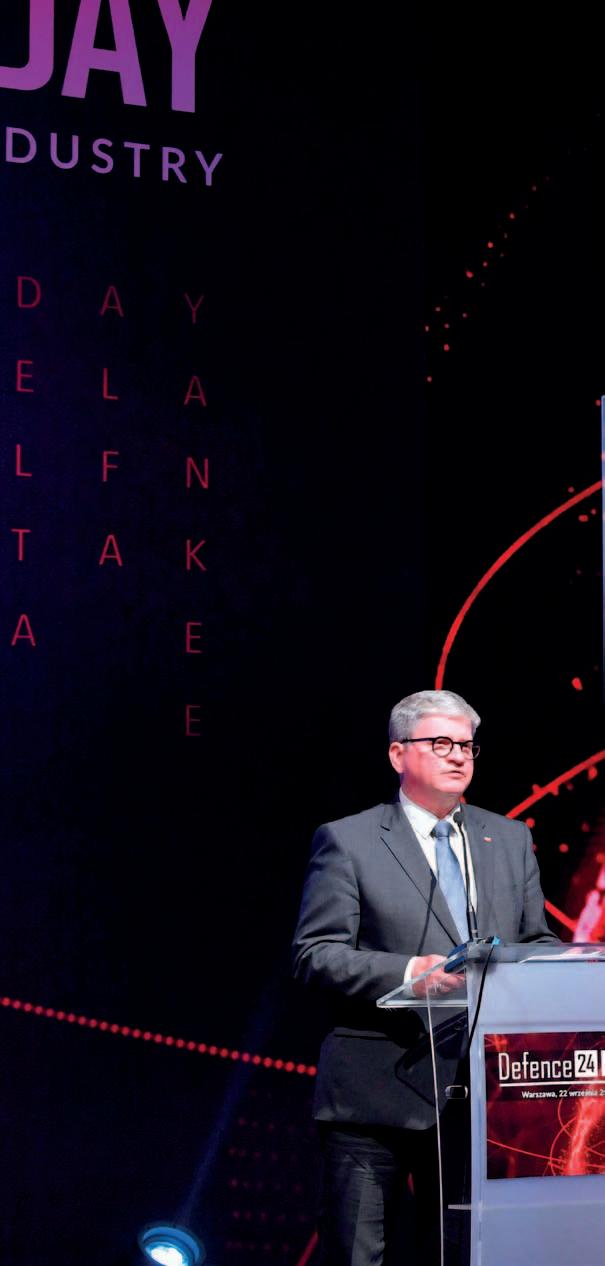
© Radek Pietruszka (PAP)
Head of tHe NatioNal Security Bureau Paweł SolocH SPeakS at tHe defeNSe Industry conFerence deFence24day. WarsaW, september 22, 2020.

its construction costs are enormous. At the same time, it carries a certain political threat that could lead to escalating tensions. Russia has already used the issue of gas supplies as a tool of pressure on countries in our region. Moreover, the investment will run along the Baltic Sea, which means that Germany and Russia will cooperate in protecting it. This could create dangerous precedents.
what does it mean?
We have to take into account here that there will be an attempt to reset relations between the United States and the countries of Western Europe, especially with Germany. And we have to consider this both in the context of the presence of American troops and in terms of ties between Germany and Russia, Germany and China, and Germany and the Three Seas Initiative. But certain American interests are clear, and they are unlikely to change with regard to China or Russia. We should expect actions to improve or intensify cooperation between the US and Germany, and this will be beneficial for transatlantic relations. Their strength and vitality are in Poland’s interest.
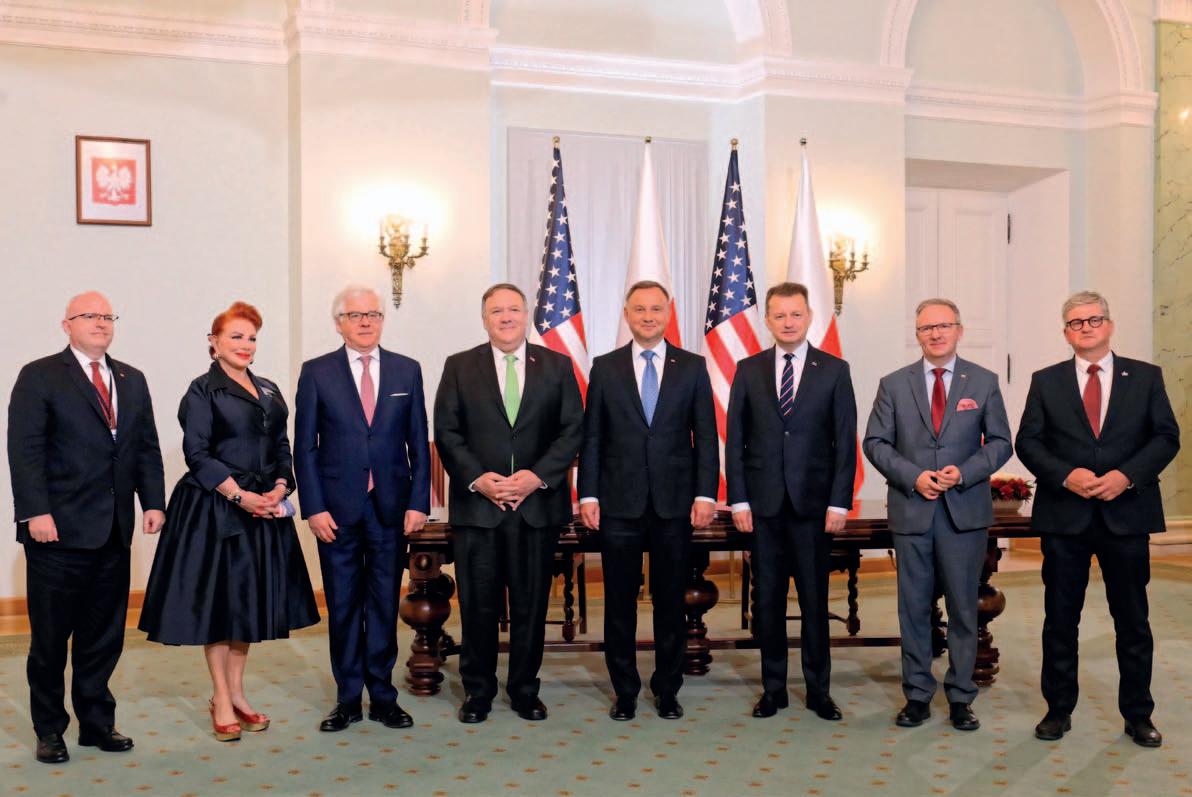
vIsIt oF the us secretary oF state. us secretary oF state mIke pompeo (Fourth leFt), presIdent of tHe rePuBlic of PolaNd aNdrzej duda (fourtH rigHt), defeNSe MiNiSter MariuSz BłaSzczak (thIrd rIght), ForeIgn mInIster jacek czaputoWIcz (thIrd leFt), us ambassador to poland georgette mosbacher (second leFt), chIeF aIde to the presIdent oF the republIc oF poland krzySztof SzczerSki (SecoNd rigHt), Head of tHe NatioNal Security Bureau Paweł SolocH (rigHt) upon sIgnIng a deFense cooperatIon deal at the presIdentIal palace. WarsaW, august 15, 2020
Paweł Supernak (PAP) ©
indeed, the first steps of the biden administration point to the improvement of ties between germany and the usa. an example of this was suspending the decision to reduce the us military presence in germany. should we expect modifications to the polish–american relations, for instance in terms of energy policy, in the times of the new administration? in your opinion, will it affect the current policy, for example in terms of imposing sanctions on the nord stream 2 proJect?
American interests and a certain vision are in many ways fixed in this area. It’s certainly not the aim of the United States to weaken economic ties with Germany. It’s the strongest country in Europe when it comes to the economy, which makes it one of the most serious partners for the United States on the Old Continent. For this reason, Americans treat Germany as a much more important partner than Russia. And we should talk about the Nord Stream 2 issue in this very context.
Meanwhile, Poland is trying to reduce its dependence on the Russian gas. By building alternative sources of energy, we show that there might be other possibilities. Through the construction of LNG infrastructure, the aim of which is to make Poland a hub for the region – not only to secure our own needs but also perhaps those of other countries – we prove our potential and become an attractive cooperation partner.
The will of the US Democrats to improve relations with their traditional large partners in Europe, such as Germany or France, does not necessarily mean a decrease in the intensity of Polish–American relations. I am convinced, based among others on my direct conversation with my American counterpart Jake Sullivan, National Security Advisor to US President Joe Biden, that our main projects will be continued, for example, the increase in the US military presence in Poland, plans related to energy, a common view on Nord Stream 2, the wish to cooperate in the field of nuclear energy and projects related to the members of the Three Seas Initiative. And the traditional topics of the Polish–American dialogue on security matters, which are Ukraine, Belarus, or Russia, will still be discussed.
this year, we are celebrating two maJor events – the 30th anniversaries of the weimar triangle and the visegrad group. i would like to refer to the first of them. we know that the ties within the weimar triangle have not been consistent for several years. the alliance of germany and france or pro-russian politics in france are at odds with poland’s vision of foreign policy. what is then the plan for the weimar triangle on its 30th anniversary?
This 30th anniversary takes place in view of the upcoming elections in Germany in the fall. Paradoxically, out of these three countries, a partner with whom long-term cooperation can be established is Poland. This is due to the ending of the electoral cycle with at least a three-year break. Some time ago we observed certain signs of France’s willingness to revive the Triangle. Unfortunately, the pandemic interfered with that. For this reason, the project of enlivening the Weimar Triangle, presented last year by President Macron during his meeting with President Duda, was not implemented. Previously, it seemed that Germany and Poland were more interested in this cooperation than France. Certainly, the Weimar Triangle has the potential to play a key role in the context of European–US relations.
can the weimar triangle become a forum for cooperation and the development of a common agenda towards the united states?
The circles in the US associated with the current administration indicate that they envisage cooperation with Poland, which liaises with Germany in this respect. Closer teamwork of Poland, Germany, and France would be a good thing because it would be easier for Washington to manage.
We certainly need to pay more attention to the context of US–European relations and to our European partners, with whom the United States will most likely try to activate certain fields of cooperation – especially those inactive during Donald Trump’s presidency. However, this does not mean that we will be marginalized. Poland and the United States have common interests at the strategic level. However, we must pay more attention to Europe in our calculations when striving to maintain a high level of relations with the United States.
what is the purpose of the weimar triangle when we see today that we have many opposing strategic interests?
Speaking of contradictions, let’s not forget that there are more strategic advantages to this cooperation. We should
remember that the French and German troops are present on the eastern flank of NATO as part of the Enhanced Forward Presence. This shows that, in practice, these countries are ready to defend our security. Of course, there are also some contradictions between us, but in different fields. The biggest problem in Polish–German relations is the issue of Nord Stream 2, a political and economic fact – precisely in that order. Nord Stream 2 is an unfavorable manifestation of German–Russian relations, and not only for Poland but also for the countries of the region. France, on the other hand, is the only EU state with nuclear weapons, it is also Europe’s largest economy after Germany. If we act together, we can achieve a lot.
in the context of the security issue you have raised, i would like to ask you about the european union army that we hear about from time to time in the media. is it today a real possibility, supplement, or an actual individual entity?
Speaking about this today, especially in a way that leads to the undermining of transatlantic relations, including ties with the United States, is harmful. We should say it clearly – Poland has been thinking this way for many years, and we are not alone. Not only the countries on the eastern flank but also, for example, the Scandinavian countries have a similar attitude towards this idea. Many allies inside Europe also see it this way – the notion of a European army as an initiative outside NATO serves, in fact, the weakening of transatlantic ties, and this is not what Poland or the rest of Europe needs. Besides, there are objectively no reasons to think otherwise.
It is hard to imagine that any country other than the US could provide a continent-wide assurance. It is equally difficult to imagine security or the foundation of certain mechanisms of military security in Europe without the United Kingdom, already outside the European Union. Similarly, when looking at our region or our eastern neighbors and the Baltic Sea area, we cannot imagine building a security system, also concerning the military, without cooperation with non-NATO countries such as Sweden or Finland, which are simultaneously developing close military cooperation with the United States.
For most countries, the idea of a European army without US participation is unacceptable. There is also the conviction that it is possible to treat it as a complement to the alliance with the United States, but for the time being, I cannot see such mechanisms. The primary field of cooperation between the EU and NATO today is investing in infrastructure and creating procedures to facilitate the movement and dislocation of troops – especially American ones – from the Alliance. We can talk about it in such terms but using the phrase ‘European army’ does more harm than good.
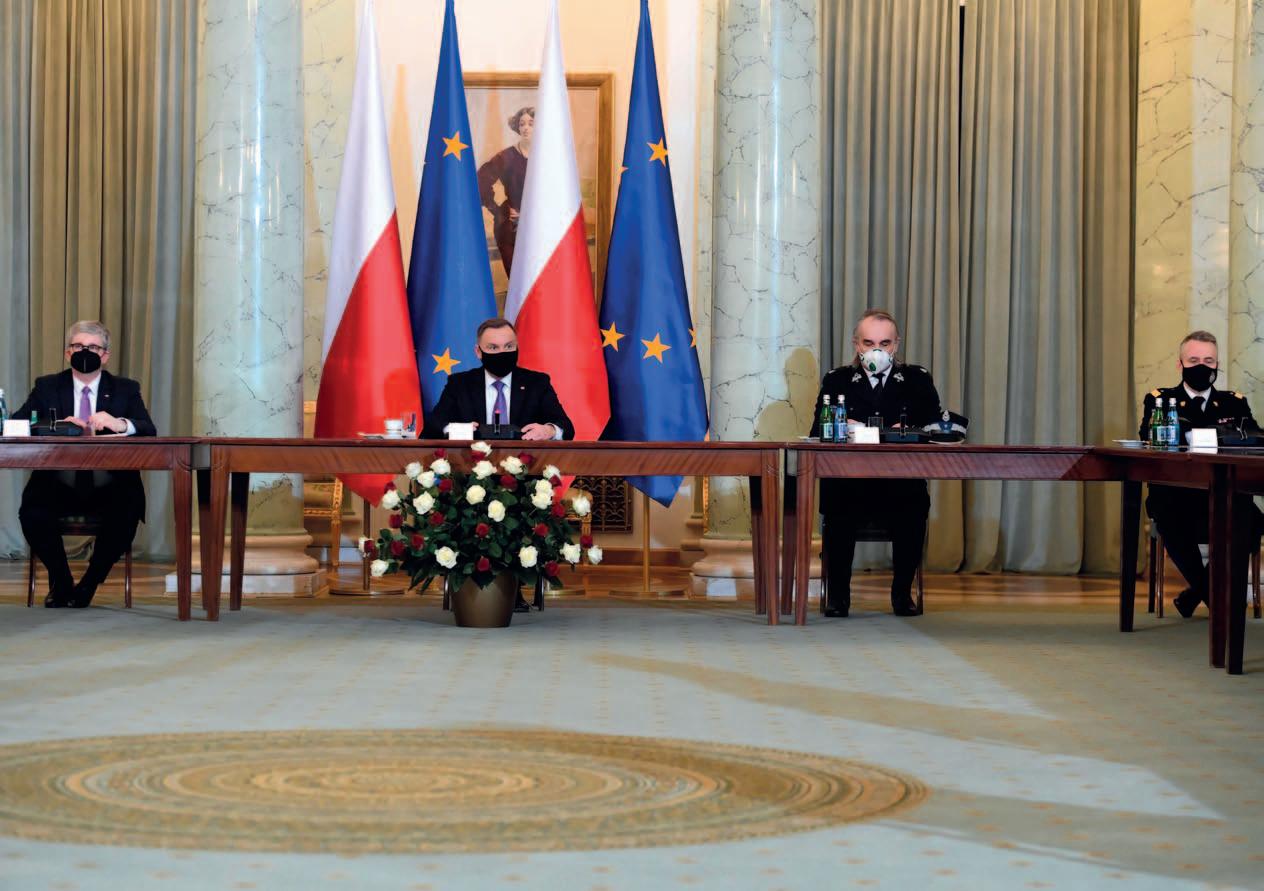
presIdent oF the republIc oF poland andrzej duda (second leFt), head oF the NatioNal Security Bureau Paweł SolocH (left), cHief coMMaNder of tHe State fire servIce bg andrzej bartkoWIak (rIght), and commander oF the volunteer FIre department Waldemar paWlak (second rIght) attend a meetIng WIth state and voluNtary fire BrigadeS iNvolved iN tHe figHt agaiNSt tHe covid-19 PaNdeMic. thIs Is the thIrd out oF a Whole range oF meetIngs held WIth representatIves of variouS circleS to diScuSS ProgreSS iN tHe year-loNg figHt agaiNSt tHe pandemIc. WarsaW, march 8, 2021.
what is closer to all of us in this context – at least from the polish perspective – is the strengthening of nato’s eastern flank through the b9 group, an alliance formed to increase security in the region.
The main success of the B9 is that, despite the initial distrust of our NATO allies, we have convinced them that the group has neither divisive nor weakening effect on the military bloc. Second, our unified voice makes other allies understand how serious the threats and challenges are in our part of Europe. The group was initiated by two states with outstanding potential – Poland
The group [B9] was initiated by two states with outstanding potential – Poland and Romania – which integrate the block between the Baltic and the Black Sea.
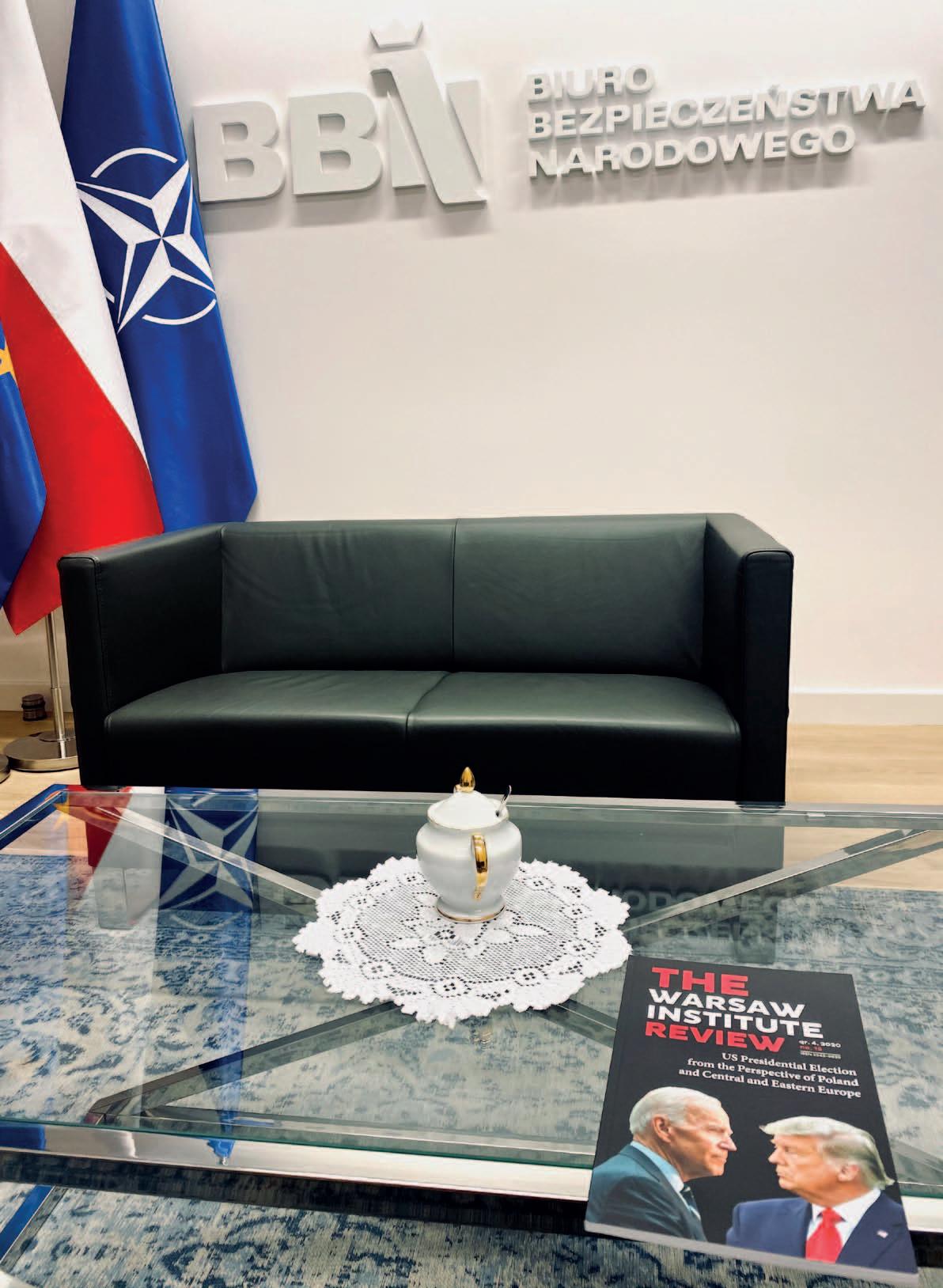
The Warsaw Institute Review ©
the headquarters oF the head oF the natIonal securIty bureau
and Romania – which integrate the block between the Baltic and the Black Sea. In a sense, the B9 is a military complement to the Three Seas Initiative. The vitality of the group, despite its varying sensitivities and planning, is seen in its entirety, not least because it stretches from north to south. Such massive military cooperation, including with its main partner, the United States, reduces the risk of potential conflict.
The non-NATO countries, Sweden and Finland, should be added to this since it is the line of threat stretching from the Arctic Sea through the Baltic Sea to the Black Sea.
in late 2019, we launched the “b9: Jacu” forum at the warsaw institute review, which brought together warsaw embassies and thinktanks from b9 countries. in addition to the subJect of strengthening nato’s eastern flank, much time was devoted to cyberthreats. will this be the most important focus of b9 today?
The B9 group focuses on both traditional and emerging security threats. I think that at this stage there is a noticeable difference in sensitivity to hybrid threats across Europe. The southern countries have migration experience, whereas the countries on NATO’s eastern flank face more traditional threats. When it comes to cybersecurity, there are certainly two organizations involved – NATO and the European Union. Undoubtedly, this is something that we need to hurry up with and we should actually fight on various levels – national and supranational, or at least local. A future potential war will certainly include cyber factors. Actually, I think we will continue to face mixed threats. New dangers appear, but the old ones are still there, an example of which is the war in Ukraine.
2021 has Just started, and there is already a lot going on in the world. what do you think are the most important challenges for this year in terms of security?
Pandemic is a topic that will engage 80 percent of public attention for at least the next six months, if, unfortunately, not longer. I think some new dangers may arise from unrest resulting from social fatigue and stress. When it comes to our immediate environment, there is a social revolt against the rigged elections in Belarus and the ongoing Russian–Ukrainian conflict. There is the situation of positional warfare, but the balance of power can always change abruptly, as in the war in Nagorno-Karabakh. We should not ignore issues involving the Far East or China. For Poland, however, the traditional key security focus will be on the processes taking place directly east of our borders.










